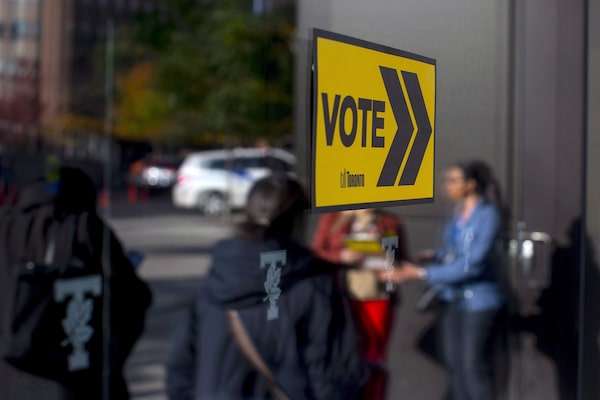
Voters line up outside a voting station to cast their ballot in the Toronto's municipal election on Oct. 22, 2018.Chris Young/The Canadian Press
On Monday, voters in all 444 of Ontario’s municipalities head to the polls to choose their local leaders (mayors or reeves, councillors and regional councillors) and school-board trustees.
John Tory wins third term as mayor in Toronto municipal election
Who can vote?
Ontarians must be Canadian citizens and at least 18 to vote. To qualify as a “resident voter,” you must live in the municipality where you intend to vote, whether you own or rent property or not. If you personally own or rent property in another municipality, you and your spouse may be eligible to cast ballots there as well. But within one municipality, you can only vote in the ward in which you live. People serving jail time cannot vote. Those convicted of a “corrupt practice” under the Municipal Elections Act, which includes bribery and tampering with election results, can also be barred from voting.
Voters can cast ballots for school trustees for the local school board for which they are listed as supporters by the Municipal Property Assessment Corporation. Ontario has four different types of school boards: English public and English “separate” or Roman Catholic, and French public and French Roman Catholic.
What do you need to vote?
To vote, you must be on the voter’s list – but you can apply to add yourself at the polls. You will be asked to produce one piece of identification that shows both your name and address. The list of accepted documents includes driver’s licences, credit-card statements and utility bills.
When and how can you vote?
In most places, including Toronto, you can vote on election day at polling stations in your area with a pencil and a paper ballot. But an increasing number of Ontario municipalities now offer online or telephone voting. And many, such as Barrie, an hour north of Toronto, have done away with in-person voting altogether. Polls are open from 10 a.m. to 8 p.m. Voters should check their municipality’s website for detailed information.
What is turnout like in municipal elections in Ontario?
Toronto’s 2018 municipal election was held in the charged atmosphere after then-new Ontario Premier Doug Ford slashed the city’s number of council seats by nearly half in the middle of the campaign. But in a race that incumbent Mayor John Tory was widely expected to win that year against former chief planner Jennifer Keesmaat, turnout was just 41 per cent. That was down sharply from 60 per cent in 2014, when Mr. Tory defeated fellow frontrunners Mr. Ford and former councillor Olivia Chow. This time, in a bid for a third term, Mr. Tory faces cycling and pedestrian advocate Gil Penalosa.
Turnout in suburban municipalities outside Toronto is usually lower, with just 27 per cent of Mississauga voters, for example, showing up in 2018. And turnout seems to be sagging at many levels. It hit a record low in June’s Ontario provincial vote election at 46 per cent. In B.C., just 36.3 per cent of eligible voters in Vancouver cast a ballot in the Oct. 15 municipal vote. However, advance voting in Ottawa, where Mayor Jim Watson’s retirement has sparked an intense race, is ahead of the totals in recent years.
What are some key races to watch?
In Brampton, west of Toronto, incumbent Mayor Patrick Brown, a former Progressive Conservative leader forced to resign amid scandal over sexual misconduct he denies, has faced a fierce challenge from Nikki Kaur, a lawyer who ran unsuccessfully for the federal Conservatives in a Hamilton riding in 2019 and held a senior role with the municipality of Brampton. With help from Nick Kouvalis, a strategist and pollster for Mr. Ford in the recent provincial election, Ms. Kaur has tried to capitalize on a string of controversies dogging Mr. Brown. (The federal Conservative Party quashed Mr. Brown’s bid for its leadership this summer, citing alleged campaign irregularities he has denied.)
Toronto’s housing crisis is top of mind as the city heads to the polls
The two provincial party leaders who quit after losing to Mr. Ford in June’s provincial vote are also running municipally this fall. Former NDP leader Andrea Horwath, a former Hamilton city councillor, is seeking the mayor’s chair there against stiff competition from Keanin Loomis, a former head of the city’s chamber of commerce, and Bob Bratina, a former mayor and Liberal MP. Former provincial Liberal leader Steven Del Duca is aiming for mayor’s office in Vaughan, where he faces challengers that include local councillor Sandra Yeung Racco.
Ottawa’s vigorous race for mayor has three recognized frontrunners: two-term councillor Catherine McKenney, former mayor and provincial Liberal cabinet minister Bob Chiarelli, and broadcaster and entrepreneur Mark Sutcliffe.